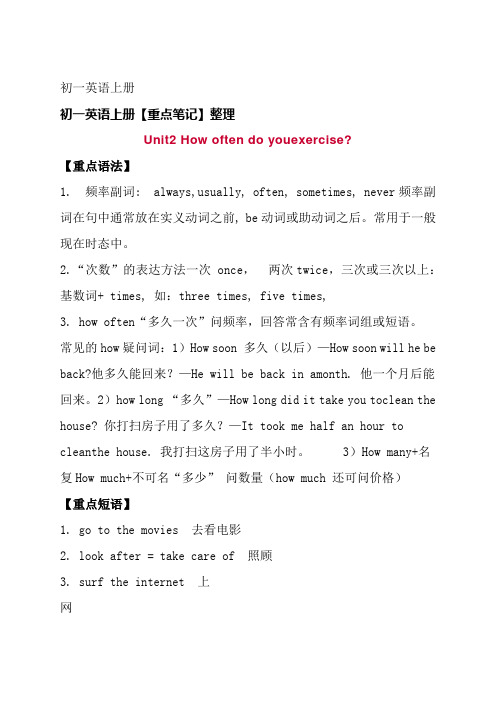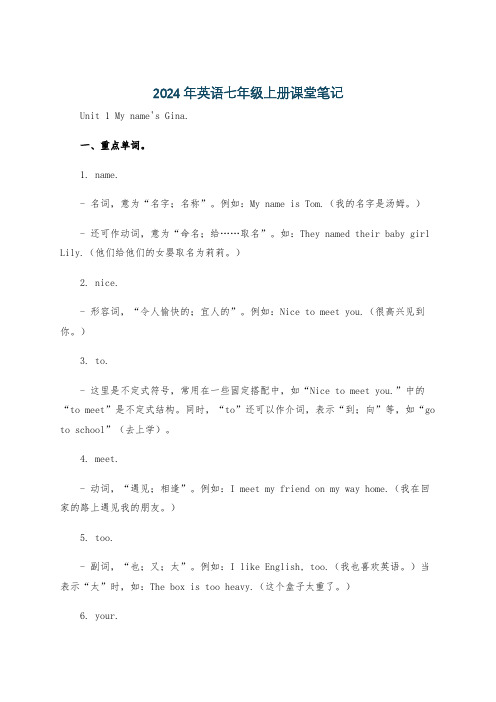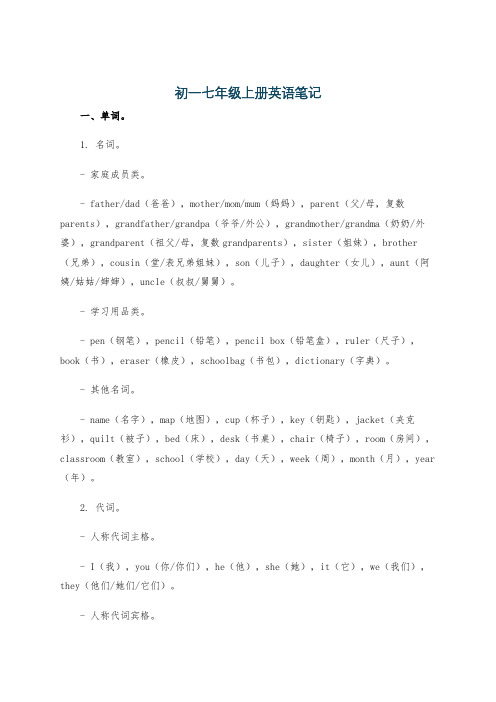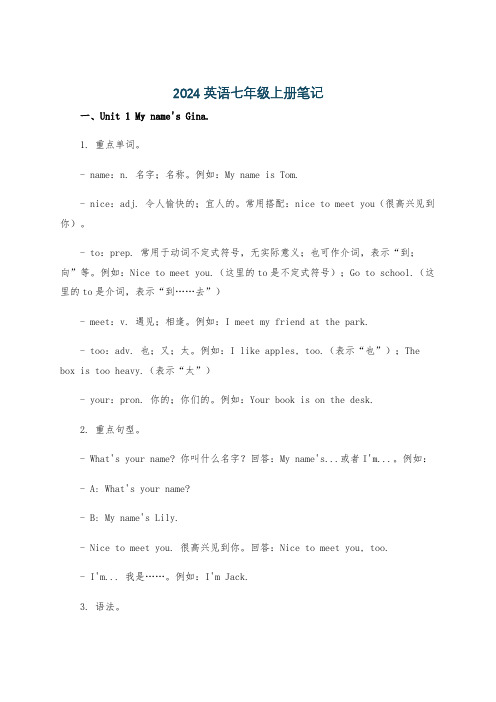七年级英语上册笔记大全
初一上册英语重点笔记

初一上册英语重点笔记一、单词部分。
1. 名词。
- 可数名词复数变化规则。
- 一般情况加 -s,如book - books,pen - pens。
- 以s,x,sh,ch结尾的加 -es,如bus - buses,box - boxes,brush - brushes,watch - watches。
- 以辅音字母+y结尾的,变y为i加 -es,如baby - babies。
- 以f或fe结尾的,变f或fe为v加 -es,如knife - knives,leaf - leaves(但也有特殊情况,如roof - roofs)。
- 重点名词。
- family(家庭;家人):作“家庭”时是单数,作“家人”时是复数概念。
例如:My family is a big one.(我的家庭是个大家庭。
)My family are all at home.(我的家人都在家。
)- friend(朋友):复数形式是friends,make friends with sb.(和某人交朋友)。
- school(学校):at school(在学校,指在上学),go to school(去上学)。
- class(班级;课):in class(在课堂上),have classes(上课)。
2. 代词。
- 人称代词主格和宾格。
- 主格:I(我),you(你;你们),he(他),she(她),it(它),we(我们),they(他们;她们;它们)。
- 宾格:me,you,him,her,it,us,them。
例如:I like him.(我喜欢他。
主格I作主语,宾格him作宾语)- 物主代词。
- 形容词性物主代词:my(我的),your(你的;你们的),his(他的),her (她的),its(它的),our(我们的),their(他们的;她们的;它们的)。
例如:This is my book.(这是我的书。
形容词性物主代词my修饰名词book)- 名词性物主代词:mine,yours,his,hers,its,ours,theirs。
七年级上册英语重点知识笔记

初一英语上册初一英语上册【重点笔记】整理Unit2 How often do youexercise?【重点语法】1. 频率副词: always,usually, often, sometimes, never频率副词在句中通常放在实义动词之前, be动词或助动词之后。
常用于一般现在时态中。
2.“次数”的表达方法一次 once,两次twice,三次或三次以上:基数词+ times, 如:three times, five times,3. how often“多久一次”问频率,回答常含有频率词组或短语。
常见的how疑问词:1)How soon 多久(以后)—How soon will he be back?他多久能回来?—He will be back in amonth. 他一个月后能回来。
2)how long “多久”—How long did it take you toclean the house? 你打扫房子用了多久?—It took me half an hour to cleanthe house. 我打扫这房子用了半小时。
3)How many+名复How much+不可名“多少” 问数量(how much 还可问价格)【重点短语】1. go to the movies 去看电影2. look after = take care of 照顾3. surf the internet 上网4. healthy lifestyle 健康的生活方式5. go skate boarding 去划板6. keep healthy=stay healthy 保持健康7. eating habits 饮食习惯8. take more exercise 做更多的运动9. the same as 与什么相同10. be different from 不同11. once a month一月一次12. twice a week一周两次13. make a difference to 对......有影响/作用14. most of the students=moststudents15. shop=go shopping=do someshopping 购物16. be goodfor 对......有益17. be bad for 对......有害18. come home from school放学回家19. of course = certainly = sure 当然20. get good grades 取得好成绩21. keep/be in good health 保持健康22. take a vacation 去度假【词语辨析】1.maybe / may bemaybe 是副词,意为“大概,可能,或许”,一般用于句首。
英语书笔记七年级上册

英语书笔记七年级上册一、Starter Unit 1 Good morning!1. 重点单词。
- good好的;morning早晨;上午;afternoon下午;evening晚上;night夜晚;hi嗨(用于打招呼);hello你好。
- 注意“good night”用于晚上告别,而“good evening”用于晚上见面打招呼。
2. 重点句型。
- Good morning/afternoon/evening! 用于不同时间段的问候。
- - How are you? - I'm fine, thank you. 这是常见的问候与回应方式。
3. 语法点。
- 字母的大小写及书写规范。
例如,大写字母一般用于句首、专有名词等。
二、Starter Unit 2 What's this in English?1. 重点单词。
- what什么;is是(用于第三人称单数);this这;这个;in用(表示使用的语言等);English英语;a/an一个(a用于辅音音素开头的单词前,an用于元音音素开头的单词前);map地图;cup杯子;ruler尺子;pen钢笔;orange橙子;jacket夹克衫;key钥匙;quilt被子;it它。
2. 重点句型。
- What's this in English? - It's a/an... 这是询问某个物品用英语怎么说的句型。
- Spell it, please. -... 用于请求对方拼写单词。
3. 语法点。
- 不定冠词a和an的用法区别。
例如,“an apple”,“a book”。
三、Starter Unit 3 What color is it?1. 重点单词。
- color颜色;red红色(的);blue蓝色(的);black黑色(的);white白色(的);purple紫色(的);yellow黄色(的);green绿色(的);the定冠词,表示特指。
2024年英语七年级上册课堂笔记

2024年英语七年级上册课堂笔记Unit 1 My name's Gina.一、重点单词。
1. name.- 名词,意为“名字;名称”。
例如:My name is Tom.(我的名字是汤姆。
)- 还可作动词,意为“命名;给……取名”。
如:They named their baby girl Lily.(他们给他们的女婴取名为莉莉。
)2. nice.- 形容词,“令人愉快的;宜人的”。
例如:Nice to meet you.(很高兴见到你。
)3. to.- 这里是不定式符号,常用在一些固定搭配中,如“Nice to meet you.”中的“to meet”是不定式结构。
同时,“to”还可以作介词,表示“到;向”等,如“go to school”(去上学)。
4. meet.- 动词,“遇见;相逢”。
例如:I meet my friend on my way home.(我在回家的路上遇见我的朋友。
)5. too.- 副词,“也;又;太”。
例如:I like English, too.(我也喜欢英语。
)当表示“太”时,如:The box is too heavy.(这个盒子太重了。
)6. your.- 形容词性物主代词,“你的;你们的”。
例如:Your book is on the desk.(你的书在桌子上。
)7. his.- 形容词性物主代词,“他的”。
例如:His name is Jack.(他的名字是杰克。
)8. her.- 形容词性物主代词,“她的”。
例如:Her pen is red.(她的钢笔是红色的。
)二、重点短语。
1. name's = name is.- 例如:My name's Gina. = My name is Gina.(我的名字是吉娜。
)2. nice to meet you.- 用于初次见面时的问候语,回答是“Nice to meet you, too.”(很高兴见到你。
初一七年级上册英语笔记

初一七年级上册英语笔记一、单词。
1. 名词。
- 家庭成员类。
- father/dad(爸爸),mother/mom/mum(妈妈),parent(父/母,复数parents),grandfather/grandpa(爷爷/外公),grandmother/grandma(奶奶/外婆),grandparent(祖父/母,复数grandparents),sister(姐妹),brother (兄弟),cousin(堂/表兄弟姐妹),son(儿子),daughter(女儿),aunt(阿姨/姑姑/婶婶),uncle(叔叔/舅舅)。
- 学习用品类。
- pen(钢笔),pencil(铅笔),pencil box(铅笔盒),ruler(尺子),book(书),eraser(橡皮),schoolbag(书包),dictionary(字典)。
- 其他名词。
- name(名字),map(地图),cup(杯子),key(钥匙),jacket(夹克衫),quilt(被子),bed(床),desk(书桌),chair(椅子),room(房间),classroom(教室),school(学校),day(天),week(周),month(月),year (年)。
2. 代词。
- 人称代词主格。
- I(我),you(你/你们),he(他),she(她),it(它),we(我们),they(他们/她们/它们)。
- 人称代词宾格。
- me(我),you(你/你们),him(他),her(她),it(它),us(我们),them(他们/她们/它们)。
- 物主代词。
- 形容词性物主代词:my(我的),your(你的/你们的),his(他的),her (她的),its(它的),our(我们的),their(他们/她们/它们的)。
- 名词性物主代词:mine(我的),yours(你的/你们的),his(他的),hers (她的),its(它的),ours(我们的),theirs(他们/她们/它们的)。
七年级上册英语笔记总结归纳

Unit 1 “How do you study for a test?”【1】Studying for a test:。
•Find out what’s going to be on the test.•Make sure you understand what you’ve studied. 。
•When you study, use different methods.•Form a study group with your friends.•Find a quiet place to study.•Review your notes and textbooks.•Take a break while you’re studying. 。
【2】Making plans:。
•Make an appointment with someone.•Make a plan for the day.•Decide where to go. 。
•Decide what to do.•Make a list of what you need. 。
•Set a time to meet.。
•Invite people to your event. 。
Unit 3 “What are the shirts made of?”【3】Talking about clothes:。
•Talk about the material of the clothes. 。
•Talk about the colour of the clothes. 。
•Talk about the style of the clothes. 。
•Talk about the size of the clot hes. 。
•Talk about what the clothes are made of. 。
•Talk about the price of the clothes. 。
七年级上册英语书笔记人教版

七年级上册英语书笔记人教版一、Starter Units 1 - 3。
1. Good morning/afternoon/evening.- 这是常见的问候语。
“Good morning”用于早上(通常到中午12点之前);“Good afternoon”用于中午12点之后到傍晚;“Good evening”用于傍晚到晚上睡觉之前。
- 回答也用相同的句子,例如:A: Good morning. B: Good morning.2. How are you?- 用于询问对方的身体状况或近况。
- 常见回答有:“I'm fine, thank you. And you?”“Fine, thanks.”“Not bad.”等。
3. Alphabet.- 26个英文字母的大小写书写。
大写字母一般占上两格,如:A、B、C;小写字母有的占一格(如:a、c、e),有的占两格(如:b、d、h),有的占三格(如:f、j)。
- 字母的读音,例如:A[ei],B[bi:],C[si:]等。
4. Colors.- 基本颜色单词:red(红色)、blue(蓝色)、green(绿色)、yellow(黄色)、black(黑色)、white(白色)等。
- 可以用来描述物体的颜色,例如:The pen is blue.二、Unit 1 My name's Gina.1. Introducing oneself.- “I'm...”和“My name is...”都可以用来介绍自己的名字。
例如:I'm Tom. = My name is Tom.- 在英语中,名字的书写顺序是名在前,姓在后。
2. Asking for someone's name.- “What's your name?”是最常见的询问对方名字的句子。
- 其回答可以是:My name is...或者I'm...3. Nice to meet you.- 用于初次见面时打招呼,回答是“Nice to meet you, too.”4. Telephone numbers.- 数字0 - 9的英语表达:zero,one,two,three,four,five,six,seven,eight,nine。
2024英语七年级上册笔记

2024英语七年级上册笔记一、Unit 1 My name's Gina.1. 重点单词。
- name:n. 名字;名称。
例如:My name is Tom.- nice:adj. 令人愉快的;宜人的。
常用搭配:nice to meet you(很高兴见到你)。
- to:prep. 常用于动词不定式符号,无实际意义;也可作介词,表示“到;向”等。
例如:Nice to meet you.(这里的to是不定式符号);Go to school.(这里的to是介词,表示“到……去”)- meet:v. 遇见;相逢。
例如:I meet my friend at the park.- too:adv. 也;又;太。
例如:I like apples, too.(表示“也”);The box is too heavy.(表示“太”)- your:pron. 你的;你们的。
例如:Your book is on the desk.2. 重点句型。
- What's your name? 你叫什么名字?回答:My name's...或者I'm...。
例如:- A: What's your name?- B: My name's Lily.- Nice to meet you. 很高兴见到你。
回答:Nice to meet you, too.- I'm... 我是……。
例如:I'm Jack.3. 语法。
- 形容词性物主代词:your(你的;你们的)。
形容词性物主代词后面要接名词。
例如:your pen(你的钢笔)。
二、Unit 2 This is my sister.1. 重点单词。
- sister:n. 姐;妹。
例如:My sister is a student.- brother:n. 兄;弟。
例如:His brother likes playing football.- parent:n. 父(母)亲。
- 1、下载文档前请自行甄别文档内容的完整性,平台不提供额外的编辑、内容补充、找答案等附加服务。
- 2、"仅部分预览"的文档,不可在线预览部分如存在完整性等问题,可反馈申请退款(可完整预览的文档不适用该条件!)。
- 3、如文档侵犯您的权益,请联系客服反馈,我们会尽快为您处理(人工客服工作时间:9:00-18:30)。
人教版新目标英语七年级各单元知识概要Unit 1 Where’s your pen pal from 一、词组be from=come from 来自...pen pal=pen friend 笔友like and dislike 好恶;爱憎live in….在...居住speak English 讲英语play sports 做体育运动a little French 一些法语go to the movies 去看电影an action movie 一部动作片on weekends 在周末Excuse me 对不起,打扰get to 到达、抵达beginning of 在...开始的时候at the end of 在...结束的时候arrive at /二、句型(1)、Where主 +be+主语+from主语+be+from+地点.(2)、Where do/does+主语+live主语+live/lives in…(3)、What language do/does +主语+speak 主语+speak/speaks….(4)、主语+like/likes+doing…三、日常交际用语1-Where is your pen pal from-He’s from China.2-Where does she live--She lives in Tokyo.3-Does she speak English-Yes,she does/No,she dosen’t.4-Is that your new pen pal-Yes,he is /No,he isn’t.5-What language does she speak-She speaks English.Unit 2 Where’s the post office一、词组post office 邮局pay phone 投币式公用电话next to 在...隔壁across from 在...对面in front of 在...前面between…and…在...和...之间on a street 在街上in the neighborhood 在附近on the right/left 在右边/在左边on one’s right/left 在某人的右边/左边turn right/left 向右/左转take a walk 散步have fun 玩得开心the way to …去...的路take a taxi 打的/乘出租车go down(along)…沿着...走go through...穿过...have a good trip 旅途愉快二、句型(1)、Is there a bank near hereYes,there is .It’s on Centre Street.No,there isn’t.(2)、Where’s the sumpermarketIt’s next to the library.(3)、Bridge Street is a good place to have fun.(4)、I hope you have a good trip.(5)、If you are hungry,you can buy food in the restaurant.(6)、Talk a walk though the park..(7)、enjoy后接名词或动词-ing形式.Do you enoy(=like) your workDo you enjoy(=like) living in the city三、日常交际用语(1)、Is there a ….句型Eg:-Excuse me.Is there a hotel in the neighborhood.-Yes, there is. No.there isn’t(2)、Where is …句型Eg:-Where is the park,please-It’s behind the bank.(肯定回答)-I’m sorry I don’t know. (否定回答)(3)、Which is the way to +地点句型.例如- Which is the way to the library.(4)、How can I get to +地点句型.例如-How can I get to the restaurant(5)、Can you tell me the way to +地点句型.例- Can you tell me the way to the post office(6)、Let me tell you the way to my house.(7)、Just go straight and turn left.Unit 3 Why do you like koalas一、词组want to do sth .想要做某事want sb to do sth 想要某做某事want sth 想要某物Let sb do sth 让某人做某事kind of 有几分\种类a kind of 一种……years old …年龄如ten years old 十岁like to do sth 喜欢做某事like doing sthplay with …与...一起玩be quiet 安静during the day 在白天at night 在夜间have a look at.. 看...one…the other 一个...另一个...二、句型(1)、-why do you like pandas-Because they’re very cure.(2)、-Why dose he like koalas-Because they are kind of interesting.(3)、-Where are lions from-Lions are from South Africa.(4)、-What animals do you like-I like elephants.三、日常交际用语(1)、-Let’s see the lions.(2)-Why do you want to see the lions-Becase they are very cute.(3)-Do you like giraffesYes,I No,I don’t(4)-What other animal do you like_I like dogs.tooother+ 名词的复数.表示没有特定的数量范围the other+名词的复数表示有特定的数量范围.(5)-Why are you looking at me-Because you are very cute.(6)-Let us play games. –Great!Let me see.Unit 4 I want to be an actor.一、词组want to be+职业想要成为。
shop assistant 店员bank clerk 银行职员work with 与。
一起工作work hard 努力工作work for 为。
而工作work as 作为。
而工作get.. from…从。
获得。
give sth.to.sb /give.sb.sth 把某物给某人正确的表示give it/them to sb.错误的表示give sb.it/themin the day 在白天at night 在夜间talk to /with 与…讲话go out to dinners 外出吃饭in a hospital 在医院newspaper reporter 报社记者movie actor 电影演员二、句型(1)-What do/does+某人+do例-What do you do-I’m a student.-What dose he do He’s a teacher.(2)-What do/does+某人+want to be例What do you want to be-I want to be a teacher. -What does she want to be She want to be a nuser.(3)-Where does your sister work-She works in a hospital.(4)-Does he work in the hospiatYes.he does/No,he doesn’t(5)-Does she work late-Yes,she does/No.she doesn’t(6)-英语中询问职业的几种表达方式What do/does …doWhat is… What is your fatherWhat’s one’s job例What’s your father’s job Unit 5 I’m watching TV.一、词组do homework 做家庭作业watch TV 看电视eat dinner 吃饭;就餐clean the room 打扫房间read newspaper/a book 看报纸/看书go to the movies 看电影write a letter 写信wait for 等待;等候talk about 谈论。
play basketball/soccer/ 打篮球/踢足球take photos 拍照TV show 电视节目Some of。
中的一些a photo of my family 我的家庭照at school 在学校be with 和。
一起in the tree 在树上二、句型(1)-What+be+主语+doing ….正在做什么-主语+be+doing。
…正在做某事。
例 -what are you doing-I’m doing my homework.(2)-Thanks for …为。
而感谢例Thanks for your letter.(3)-Here are/is…例Here are some of my photos.Here is a photo of my family.(4)-That sounds good.(5)-This TV show is boring.三、日常交际用语(1)-Do you want to go to the movices –Sure.(2)-When do you want to go –Let’s go at seven.(3)-Where do people play basketball –At school.(4)-What’s he waiting for-He’s waiting for a bus.(5)-What’s he reading He’s reading a newspaper.1)现在在进行时的形式是助动词be(am,is,are)+动词-ing形式(也叫现在分词),表示现在(说话的瞬间)正在进行或发生的动作。
